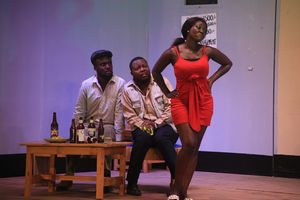
Left to right: Jannes Merksx (the Researcher from Netherlands) and Alex Mukulu (The Storyteller) in one of the scenes in Kulunkalu and Kulumbisi at the National Theatre in Kampala in April. PHOTOS | PATRICK SSENTONGO
After a 17-year hiatus from the stage, Alex Mukulu, a legendary Ugandan playwright, has returned to the local theatre with his latest production Kulunkalu ne Kulumbisi (Kulunkalu and Kulumbisi)— an African adaptation of William Shakespeare’s timeless classic play, Romeo and Juliet.
Plot
Romeo and Juliet, as adapted by Mukulu, is presented in an African culture, language, music, lyrics, costumes, dances, props and stage setting. It is Africanised, or for this matter, Ugandanised in such a plot to resonate with Uganda’s current political, social and economic environment without changing Shakespeare’s theme of universal love between two feuding families/communities.
In Mukulu’s version, the feud is between the yellow city and red ghetto where Kulumbisi (Juliet) and Kulunkalu (Romeo) fall in love at a party.
They decide against all odds that they should be married. Immediately thereafter, a pastor secretly marries them, hoping to end the conflict between the rich and the poor.
In an encounter of social differences, a fight breaks out in which Kulunkalu kills the brother of Kulumbisi and he is banished from the country.
Kulunkalu and Kulumbisi spend the night together and then Kulunkalu leaves for exile.
Kulumbisi’s father forces her into a marriage with a government official. Kulunkalu wants to disrupt Kulumbisi’s marriage to the government official. She takes a potion given to her by the pastor to disguise her as dead.
The pastor was to send Kulunkalu a message to be at Kulumbisi’s tomb when she wakes up, but their plan fails because Kulunkalu does not get this message.
Kulunkalu instead learns that Kulumbisi is dead. Kulunkalu kills himself, and when Kulumbisi wakes up and she sees her lover’s dead body, she commits suicide.
Their deaths appear finally to end the disputes, especially in reducing the gap between the poor and the rich, who later live happily in harmony and understanding for evermore.
The cast
The cast has Charles Mukisa playing the role of Romeo, Ameria Nankya is Juliet, while Ann Kavuma is Juliet’s Senga (Auntie). Mukulu plays the role of the storyteller, Jannes Merksx is the researcher from Netherlands, Musa Ssempebwa (Kabaka), and Benjamin Nashimoro as the witchdoctor, among others. The choreographer is Musa Ssempebwa.

“I have chosen Kulumbisi for my project. Kulumbisi is a strong independent young lady. She demonstrates her intelligence when communicating with Kulunkalu and with her family. She is also seen as beautiful by both Kulunkalu and Paris. She married Kulunkalu for love, not for lust. She knew what she wanted and she went for it. Like any young teenager, she was at a crossroads throughout the entire play,” says Mukulu, who is also the director of the play.
“In the end, she was abandoned by her family and saw no other option than to fake her death and wait for Kulunkalu to return. Unfortunately, there was miscommunication and Kulunkalu was dead by the time Kulumbisi awoke,” he adds.
Play’s lessons
Mukulu says Kulunkalu and Kulumbisi does not make a specific moral statement about the relationships between love and society, religion, and family; rather, it portrays the chaos and passion of being in love, combining images of love, violence, death, religion, and family in an impressionistic rush leading to the play’s tragic conclusion.
Kulunkalu and Kulumbisi was staged free-of-charge at the National Theatre in Kampala from March 29 to April 21. Mukulu says he staged this show free-of-charge for theatre to happen again. To bring theatre back to its former glory, and theatre for art’s sake. And to bring people back to theatre to think.
Mukulu says Ugandans who did not attend the show missed a window through which they can peep to resolve conflicts.
“Kulunkalu and Kulumbisi can teach us three life lessons,” the playwright says, adding, “The first lesson is: don’t make rash decisions. The second lesson is: think through the decisions. The third lesson is: young love or obsession is not a good reason to kill yourself.”
Per Mukulu, “the main message of Kulunkalu and Kulumbisi is that love can be both beautiful and tragic. The play explores the powerful force of love and its ability to transcend social barriers, but it also highlights the destructive consequences of impulsive actions fuelled by passion.”
A Shakespearean Romeo and Juliet
An age-old vendetta between two powerful families erupts into bloodshed. A group of masked Montagues risk further conflict by gatecrashing a Capulet party. A young lovesick Romeo Montague falls instantly in love with Juliet Capulet, who is due to marry her father’s choice, Count Paris. With the help of Juliet’s nurse, the women arrange for the couple to marry the next day, but Romeo’s attempt to halt a street fight leads to the death of Juliet’s own cousin, Tybalt, for which Romeo is banished. In a desperate attempt to be reunited with Romeo, Juliet follows the Friar’s plot and fakes her own death. The message fails to reach Romeo, and believing Juliet dead, he takes his life in her tomb. Juliet wakes to find Romeo’s corpse beside her and kills herself. The grieving families agree to end their feud.
Source: https://www.shakespeare.org.uk




